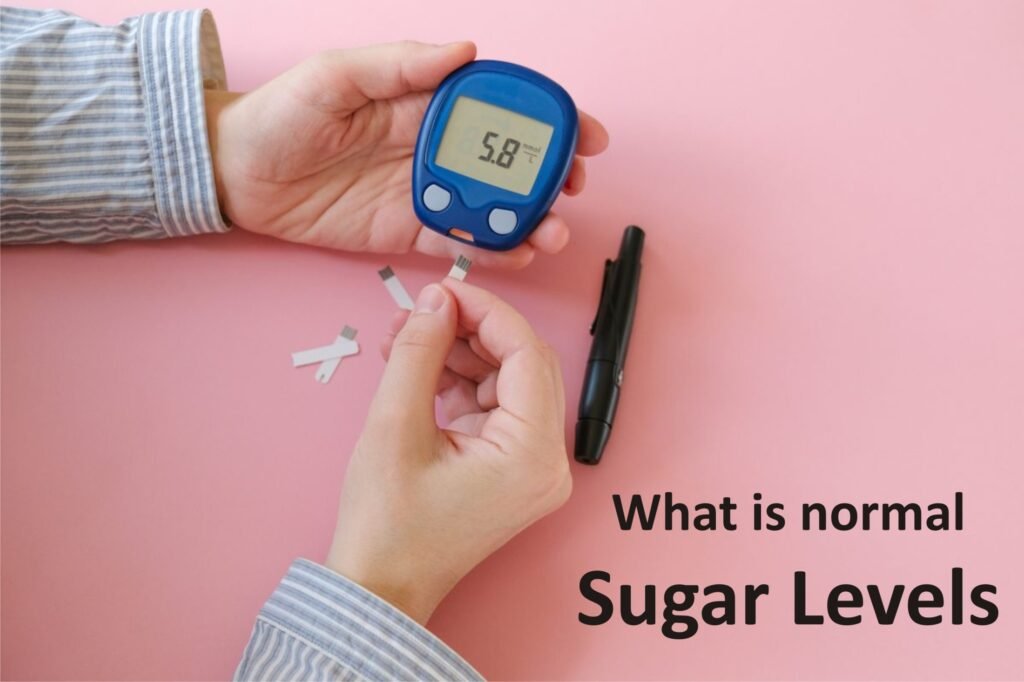
There are currently more diabetes patients than ever before. Both numbers and percentages of the population are arising, And it is only when we or our loved ones have diabetes that we stop to consider blood sugar levels. In this article, we shall discuss all about normal blood sugar levels.
What we normally call blood sugar level or blood sugar concentration is Glycaemia or blood glucose level. It refers to the measure of glucose concentration in the blood.
Let us discuss normal blood sugar levels. The answer depends on several factors including age, whether one has had meals, weight, etc. There are certain foods and fruits that you can eat if you have diabetes. The following are some of the helpful figures:
Unless a person has diabetes, the blood sugar that has not taken a meal should be between 70 and 99 milligrams per deciliter or between 3.9 and 5.5 mmol per liter. If someone has diabetes, the recommended range is higher between 80 and 130 milligrams per deciliter which falls between 4.4 MMOl per liter.
There is a spike in blood sugar after meals. About two hours after a meal, it can go up to 140 milligrams per deciliter or 7.8 MMOL per liter even for a person without diabetes while for a person with diabetes, it can go up to 180 milligrams per deciliter.
The hemoglobin A1c or HbA1c is a test that measures the amount of glucose attached to a person’s hemoglobin and thus is a good indicator of blood sugar levels. For a normal person without diabetes, it should be less than 5.7 percent while for people with diabetes it should be less than seven percent.
Please note that these figures are for general-purpose only and the numbers may be different for specific patients. These blood sugar ranges must be kept in mind. If there is a reason to believe one has blood sugar in an abnormal range, corrective measures should be taken to remedy the situation.
Moreover, you can also check out the normal blood sugar level chart with proper explanations here!
There are several questions about normal sugar levels. The following are some of the most Frequently Asked Questions (F.A.Q.s) :
Question: What is blood glucose, anyway? Why is it important?
Answer: Blood glucose is the amount of glucose in human blood. Glucose comes from food — specifically food containing carbohydrates such as bread, fruits, etc. In the right quantities, it is needed by the body so that the cells in the body can use it to generate energy in presence of oxygen, About half of this energy is generated by the brain alone.
Question: What are the symptoms of abnormal glucose levels?
Answer: Symptoms of diabetes are indicators of abnormal glucose levels but just because one doesn’t have symptoms doesn’t mean, one doesn’t have abnormal glucose levels. Type-2 diabetes patients for example don’t show these symptoms. The symptoms of low sugar levels include weakness, fatigue, frequent need to go to the toilet, etc. Chronic high blood glucose levels can also lead to severe complications of the heart, kidney, and eyes as well as nerve damage.
Question: How to measure blood sugar levels?
Answer: A health expert will measure your blood sugar levels with the help of glucose meters. Occasionally, Continuous Glucose Monitor, or CGM, is required – it is an expensive monitor which reads glucose in the interstitial every five minutes.
Question: What is hemoglobin?
Answer: Hemoglobin is the red part of red blood cells and is responsible for carrying oxygen from the lungs to the rest of your body.
Question: What to do when your blood sugar is not normal?
Answer: If one doesn’t have blood sugar right, one should see a health expert about it immediately. That applies to people who are on diabetes meds as well.
Question: What are the differences between type-1 and type-2 diabetes?
Answer: Type-1 diabetes is when a person’s body is not making enough insulin or has stopped making insulin altogether. In type-2 diabetes, the body creates insulin but insulin is unable to break down the glucose in the blood – the condition is called insulin resistance.
Question: How to maintain blood sugar levels?
Answer: To maintain blood sugar levels, it is important to ensure to make some changes in lifestyle. This will involve changing toward a balanced diet. Depending on whether one is low or high in blood sugar levels, one may need to increase or reduce the number of carbohydrates in one’s diet. One may also need to do cardiovascular exercises. Any such changes should first be approved by health experts.
If the reader has any other questions, they should feel free to ask them here. Also, you can check out our article on types of diabetes in detail here!
One can easily wrap up the above discussion by concluding that it is really crucial to know one’s sugar levels and to maintain decent sugar levels.